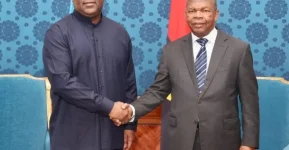A remarkable diplomatic pivot emerged from Angola as President Félix Tshisekedi of the Democratic Republic of Congo unexpectedly opened the door to direct negotiations with M23 rebels. The breakthrough came during discussions with Angolan President João Lourenço, with Angola positioning itself as a critical mediator to resolve the long-standing conflict.
Angola stepped forward to establish communication channels with M23, paving the way for face-to-face talks between the DRC government and the rebel movement. The Presidential Palace in Luanda announced plans to host negotiations aimed at achieving a comprehensive peace agreement for the troubled eastern regions of the Democratic Republic of Congo.
Presidential spokesperson Tina Salama from the DRC cautiously acknowledged the mediation efforts, reaffirming Kinshasa's commitment to existing diplomatic frameworks. She specifically highlighted the continued relevance of the Nairobi process and United Nations Security Council Resolution 2773, which demands an immediate ceasefire and withdrawal of armed groups from occupied territories.
Tshisekedi's decision marks a significant departure from his previous stance of rejecting talks and pursuing military solutions. The M23 rebels, who have seized strategic locations including Goma and Bukavu, have long advocated for direct dialogue, arguing they protect the rights of marginalized Congolese Tutsis facing systematic discrimination.
International pressure has mounted from the European Union, United States, and United Kingdom, all of which condemn M23's territorial expansion and call for Rwanda to withdraw military support. The United Nations Security Council has repeatedly urged an immediate halt to hostilities and a return to peaceful negotiations.
The proposed peace talks carry immense stakes for the region. Thousands of civilians have been displaced by ongoing conflicts, and the success of negotiations will depend on both sides demonstrating a genuine commitment to political dialogue. Regional actors, including Rwanda and Uganda, will play crucial roles in supporting or undermining the mediation process.
Observers are keenly watching whether M23 will suspend military operations in North and South Kivu. The upcoming Luanda negotiations represent a critical opportunity to prevent further escalation and potentially chart a path toward lasting peace in a region devastated by prolonged armed conflict.
Angola stepped forward to establish communication channels with M23, paving the way for face-to-face talks between the DRC government and the rebel movement. The Presidential Palace in Luanda announced plans to host negotiations aimed at achieving a comprehensive peace agreement for the troubled eastern regions of the Democratic Republic of Congo.
Presidential spokesperson Tina Salama from the DRC cautiously acknowledged the mediation efforts, reaffirming Kinshasa's commitment to existing diplomatic frameworks. She specifically highlighted the continued relevance of the Nairobi process and United Nations Security Council Resolution 2773, which demands an immediate ceasefire and withdrawal of armed groups from occupied territories.
Tshisekedi's decision marks a significant departure from his previous stance of rejecting talks and pursuing military solutions. The M23 rebels, who have seized strategic locations including Goma and Bukavu, have long advocated for direct dialogue, arguing they protect the rights of marginalized Congolese Tutsis facing systematic discrimination.
International pressure has mounted from the European Union, United States, and United Kingdom, all of which condemn M23's territorial expansion and call for Rwanda to withdraw military support. The United Nations Security Council has repeatedly urged an immediate halt to hostilities and a return to peaceful negotiations.
The proposed peace talks carry immense stakes for the region. Thousands of civilians have been displaced by ongoing conflicts, and the success of negotiations will depend on both sides demonstrating a genuine commitment to political dialogue. Regional actors, including Rwanda and Uganda, will play crucial roles in supporting or undermining the mediation process.
Observers are keenly watching whether M23 will suspend military operations in North and South Kivu. The upcoming Luanda negotiations represent a critical opportunity to prevent further escalation and potentially chart a path toward lasting peace in a region devastated by prolonged armed conflict.












